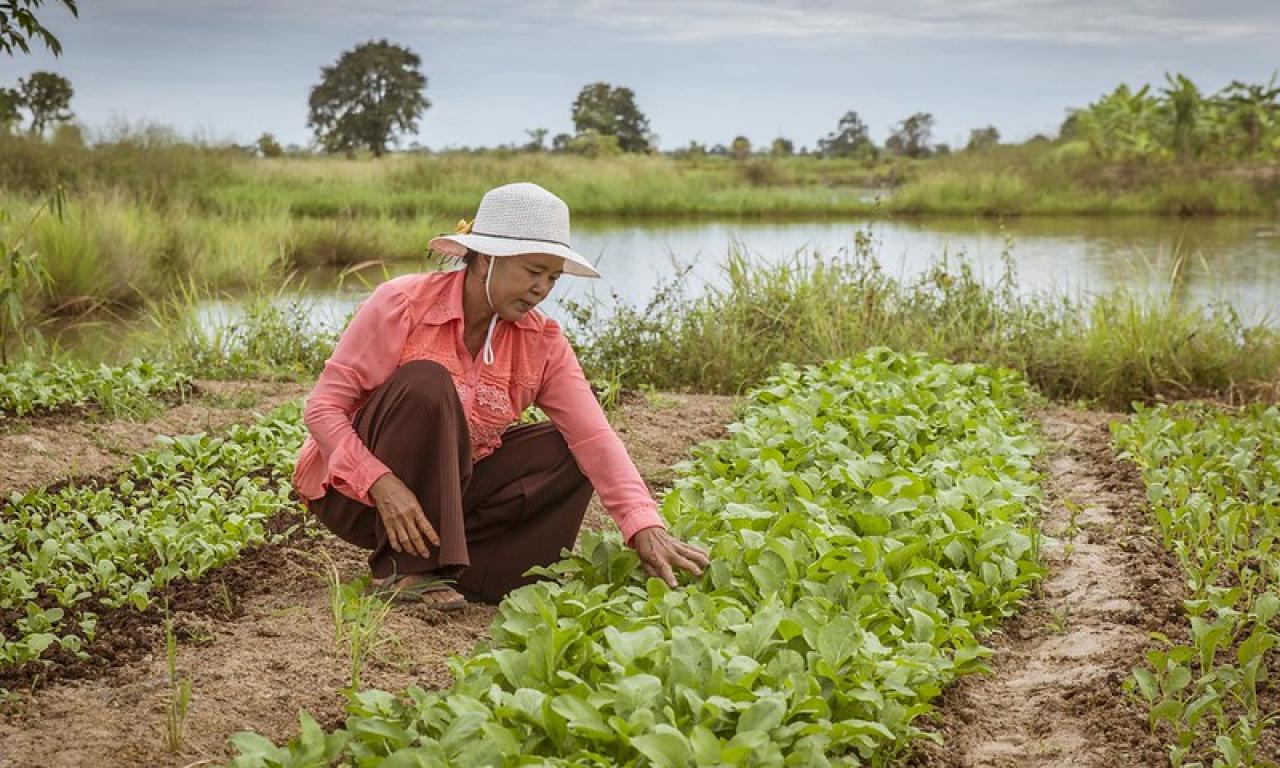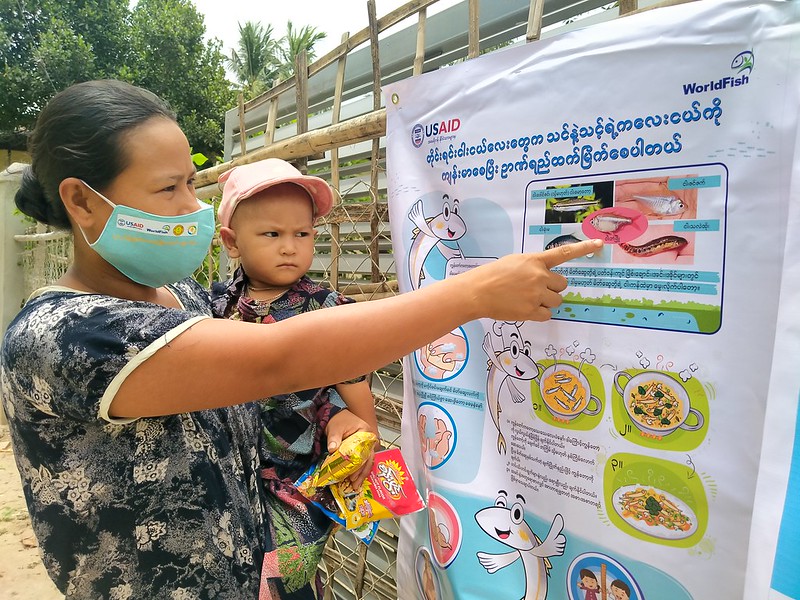
- A new paper provides a detailed overview of how the concept of aquatic food systems is currently being applied in food systems literature
- Researchers found an overemphasis on production and a lack of attention to nutritional outcomes in the majority of publications
- Conversely, holistic food systems research seeks to examine multiple aspects of food along value chains and how the factors interact
Faced with numerous challenges to nourishing a growing population, food system researchers are looking to shift focus beyond food production towards a more holistic approach. Such research aims to integrate all the social, economic, health and environmental aspects of food into a wider systems framework to achieve more equitable and sustainable outcomes.
By examining all aspects of food from production through to consumption, food systems research can illuminate the relationship between different components of the supply chain and how they interact in order to improve food access—because the quantity of food produced is often not the only variable underpinning malnutrition.
Yet only five percent of food systems research since 1970 has explicitly considered aquatic food systems and their components, despite the outsized role they play in nourishing the poor and vulnerable and improving global food security.
To better understand the role of aquatic foods in food systems and fill in crucial knowledge gaps, a new paper, Nudging fisheries and aquaculture research toward food systems, systemically reviewed how aquatic foods are currently being examined in food systems literature and determined which system components, relationships and geographies have received the majority of attention.
When aquatic foods were included in food systems analyses, the authors found that nearly three-quarters of the reviewed papers focused on production and only one-third of articles went beyond finfish to examine multiple aquatic foods.
“In our literature review, we found that a large share of research still focuses on finfish production with little attention paid to more diverse species or food processing, distribution and markets. These missing components of food systems are critical to incorporate into food systems research as they underpin both access to and utilization of food,” said Fiona Simmance, lead co-author and a food systems scientist at WorldFish.
The paper’s authors ultimately concluded that the biggest hurdle to food security was not food availability but rather accessibility. Increased food production does not necessarily translate to improved access for the poor and vulnerable—particularly when increases in production occur outside local communities.
While food systems framing is becoming a mainstream approach, the review ultimately showed that food systems research often has too narrow of a focus, overlooking social inequalities and complex drivers and trade-offs.
A landmark study, it was the first time such a comprehensive review of food systems literature has been undertaken. The research was led by WorldFish and the CGIAR Research Program on Agriculture for Nutrition and Health (A4NH), headed by the Food Policy Research Institute, in partnership with researchers from Wageningen University and the ARC Centre of Excellence for Coral Reef Studies.
Leveraging food systems for multiple wins

In terms of caloric content, the world already produces more than 1.5x food required by the human population. However, many of these foods are either nutritionally devoid or unaffordable to the majority of consumers in low- and middle-income countries.
This leads to many low-income consumers being plagued by the triple burden of malnutrition: undernutrition from a lack of food; “hidden hunger” from nutrient-poor diets/micronutrient deficiencies; and overnutrition from processed foods.
Ensuring availability and access to diverse, nutritious foods is thus a key consideration of food systems research. Yet, only 13 percent of studies in the review specifically examined low- and middle-income countries, which are the most vulnerable to undernutrition, and few studies accounted for diverse species like molluscs and seaweeds that are rich in bioavailable micronutrients.
“Diverse aquatic foods are often overlooked in food systems research, despite providing a nutritious, accessible and resilient year-round food source for vulnerable and marginalized groups,” explained Simmance. “However, increased research attention is also needed to examine trade-offs between the nutrition and sustainability of these foods.”
Food systems are a major contributor to greenhouse gas emissions, accounting for over 25 percent of anthropogenic emissions globally. Researchers are therefore working to leverage the food systems concept for multiple wins, striving to improve both the environmental and social sustainability of food.
“Our food system relies on a healthy planet and its wild and cultivated resources to nourish people. However, the resources are finite and food production is the biggest threat to our natural environment today. In low- and middle-income countries, millions of people directly depend on the natural environment for food, overlapping environmental sustainability goals with food security,” said Simmance.
Linking research to practice

The food systems framework ultimately allows researchers to identify drivers of food systems—whether cultural preferences, socioeconomic barriers or varying degrees of sustainability—and their interactions.
“A food system perspective is about better comprehending the relationships between food production, provision and consumption. By enabling such complex understanding, food systems research makes it possible to identify levers in the system and nudge the system in the right direction for the most vulnerable groups,” said Xavier Tezzo, co-author and program coordinator at WorldFish.
For instance, aquaculture production is often presented as a complement to capture fisheries in terms of the quantity of fish produced, but the relationship between the two goes beyond production—fish produced from aquaculture are not necessarily as accessible to coastal communities as wild-caught fish.
"In Myanmar, there is tremendous development of aquaculture alongside a relative decline of wild capture fisheries. From a production perspective, researchers typically assume that aquaculture development somehow 'compensates' for the decline in fisheries. By considering fish distribution and consumption dynamics, a food systems lens allows for a better understanding of the implications that the transformation of production systems have for food security, notably in terms of access and availability,” said Tezzo.
This is echoed by an example of Peru cited in the review, where researchers found Peruvian anchovies are almost exclusively exported for aquaculture and only two percent retained for local consumption. Therefore, increases in quantity produced would have little impact on the diets of local people unless matched by shifts in policy.
The review ultimately found that food systems research tends to overemphasize production while overlooking consumption and nutritional outcomes, despite being a critical component of food systems.
Thus, it's essential that food systems research examine multiple components of food supply chains to better understand interactions and improve outcomes. Researchers can also apply the food systems framework to consider the impacts of different aquatic food production systems and their relationship to one another.
Although food systems are extraordinarily complex, research has started to build an improved understanding of how food systems function and their influence on human, societal and environmental well-being. The literature review is only the latest in a burgeoning research field aiming to nourish people and planet.
